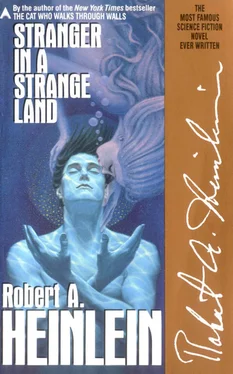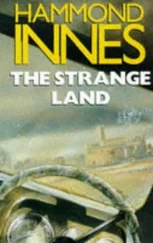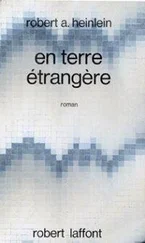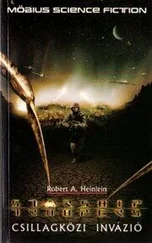Robert Heinlein - Stranger in a Strange Land
Здесь есть возможность читать онлайн «Robert Heinlein - Stranger in a Strange Land» весь текст электронной книги совершенно бесплатно (целиком полную версию без сокращений). В некоторых случаях можно слушать аудио, скачать через торрент в формате fb2 и присутствует краткое содержание. Жанр: Фантастика и фэнтези, на английском языке. Описание произведения, (предисловие) а так же отзывы посетителей доступны на портале библиотеки ЛибКат.
- Название:Stranger in a Strange Land
- Автор:
- Жанр:
- Год:неизвестен
- ISBN:нет данных
- Рейтинг книги:3 / 5. Голосов: 1
-
Избранное:Добавить в избранное
- Отзывы:
-
Ваша оценка:
- 60
- 1
- 2
- 3
- 4
- 5
Stranger in a Strange Land: краткое содержание, описание и аннотация
Предлагаем к чтению аннотацию, описание, краткое содержание или предисловие (зависит от того, что написал сам автор книги «Stranger in a Strange Land»). Если вы не нашли необходимую информацию о книге — напишите в комментариях, мы постараемся отыскать её.
Stranger in a Strange Land — читать онлайн бесплатно полную книгу (весь текст) целиком
Ниже представлен текст книги, разбитый по страницам. Система сохранения места последней прочитанной страницы, позволяет с удобством читать онлайн бесплатно книгу «Stranger in a Strange Land», без необходимости каждый раз заново искать на чём Вы остановились. Поставьте закладку, и сможете в любой момент перейти на страницу, на которой закончили чтение.
Интервал:
Закладка:
Ben looked at her. Presently Jubal said gruffly, “All right, blow your nose and wipe your eyes—she accepts your apology. Come on and sit down. That’s enough for one lesson.”
“No,” Caxton answered, “I want to know about these others. How about this one? It doesn’t bother me as much… I can see it’s a young girl, right off. But why tie her up like a pretzel?”
Jubal looked at the replica “Caryatid Who has Fallen under the Weight of her Stone” and smiled. “Call it a tour de force in empathy, Ben. I won’t expect you to appreciate the shapes and masses which make that figure much more than a ‘pretzel’—but you can appreciate what Rodin was saying. Ben, what do people get out of looking at a crucifix?”
“You know how much I go to church.”
“‘How little’ you mean. Still, you must know that, as craftsmanship, paintings and sculpture of the Crucifixion are usually atrocious—and the painted, realistic ones often used in churches are the worst of all… the blood looks like catsup and that ex-carpenter is usually portrayed as if he were a pansy… which He certainly was not if there is any truth in the four Gospels at all. He was a hearty man, probably muscular and of rugged health. But despite the almost uniformly poor portrayal in representations of the Crucifixion, a poor one is about as effective as a good one for most people. They don’t see the defects; what they see is a symbol which inspires their deepest emotions; it recalls to them the Agony and Sacrifice of God.”
“Jubal, I thought you weren’t a Christian?”
“What’s that got to do with it? Does that make me blind and deaf to fundamental human emotion? I was saying that the crummiest painted plaster crucifix or the cheapest cardboard Christmas Crèche can be sufficient symbol to evoke emotions in the human heart so strong that many have died for them and many more live for them. So the craftsmanship and artistic judgment with which such a symbol is wrought are largely irrelevant. Now here we have another emotional symbol—wrought with exquisite craftsmanship, but we won’t go into that, yet. Ben, for almost three thousand years or longer, architects have designed buildings with columns shaped as female figures—it got to be such a habit that they did it as casually as a small boy steps on an ant. After all those centuries it took Rodin to see that this was work too heavy for a girl. But he didn’t simply say, ‘Look, you jerks, if you must design this way, make it a brawny male figure.’ No, he showed it… and generalized the symbol. Here is this poor little caryatid who has tried—and failed, fallen under the load. She’s a good girl—look at her face. Serious, unhappy at her failure, but not blaming anyone else, not even the gods… and still trying to shoulder her load, after she’s crumpled under it.
“But she’s more than good art denouncing some very bad art; she’s a symbol for every woman who has ever tried to shoulder a load that was too heavy for her—over half the female population of this planet, living and dead, I would guess. But not alone women—this symbol is sexless. It means every man and every woman who ever lived who sweated out life in uncomplaining fortitude, whose courage wasn’t even noticed until they crumpled under their loads. It’s courage, Ben, and victory.”
“‘Victory?’”
“Victory in defeat, there is none higher. She didn’t give up, Ben; she’s still trying to lift that stone after it has crushed her. She’s a father going down to a dull office job while cancer is painfully eating away his insides, so as to bring home one more pay check for the kids. She’s a twelve-year old girl trying to mother her baby brothers and sisters because Mama had to go to Heaven. She’s a switchboard operator sticking to her job while smoke is choking her and the fire is cutting off her escape. She’s all the unsung heroes who couldn’t quite cut it but never quit. Come. Just salute as you pass her and come see my Little Mermaid.”
Ben took him precisely at his word; if Jubal was surprised, he made no comment. “Now this one,” he said, “is the only one Mike didn’t give to me. But there is no need to tell Mike why I got it… aside from the self-evident fact that it’s one of the most delightful compositions ever conceived and proudly executed by the eye and hand of man.”
“She’s that, all right. This one I don’t have to have explained—it’s just plain pretty!”
“Yes. And that is excuse in itself, just as with kittens and butterflies. But there is more to it than that… and she reminded me of Mike. She’s not quite a mermaid—see?—and she’s not quite human. She sits on land, where she has chosen to stay… and she stares eternally out to sea, homesick and forever lonely for what she left behind. You know the story?”
“Hans Christian Andersen.”
“Yes. She sits by the harbor of København—Copenhagen was his home town—and she’s everybody who ever made a difficult choice. She doesn’t regret her choice, but she must pay for it; every choice must be paid for. The cost to her is not only endless homesickness. She can never be quite human; when she uses her dearly bought feet, every step is on sharp knives. Ben, I think that Mike must always walk on knives—but there is no need to tell him I said so. I don’t think he knows this story or, at least, I don’t think he knows that I connect him with it.”
“I won’t tell him.” Ben looked at the replica. “I’d rather just look at her and not think about the knives.”
“She’s a little darling, isn’t she? How would you like to coax her into bed? She would probably be lively, like a seal, and about as slippery.”
“Cripes! You’re an evil old man, Jubal.”
“And getting eviler and eviler by the year. Uh… we won’t look at any others; three pieces of sculpture in an hour is more than enough—usually I don’t let myself look at more than one in a day.”
“Suits. I feel as if I had had three quick drinks on an empty stomach. Jubal, why isn’t there stuff like this around where a person can see it?”
“Because the world has gone nutty and contemporary art always paints the spirit of its times. Rodin did his major work in the tail end of the nineteenth century and Hans Christian Andersen antedated him by only a few years. Rodin died early in the twentieth century, about the time the world started flipping its lid… and art along with it.
“Rodin’s successors noted the amazing things he had done with light and shadow and mass and composition—whether you see it or not—and they copied that much. Oh, how they copied it! And extended it. What they failed to see was that every major work of the master told a story and laid bare the human heart. Instead, they got involved with ‘design’ and became contemptuous of any painting or sculpture that told a story—sneering, they dubbed such work ‘literary’—a dirty word. They went all out for abstractions, not deigning to paint or carve anything that resembled the human world.”
Jubal shrugged. “Abstract design is all right—for wall paper or linoleum. But art is the process of evoking pity and terror, which is not abstract at all but very human. What the self-styled modern artists are doing is a sort of unemotional pseudo-intellectual masturbation… whereas creative art is more like intercourse, in which the artist must seduce—render emotional—his audience, each time. These laddies who won’t deign to do that—and perhaps can’t—of course lost the public. If they hadn’t lobbied for endless subsidies, they would have starved or been forced to go to work long ago. Because the ordinary bloke will not voluntarily pay for ‘art’ that leaves him unmoved—if he does pay for it, the money has to be conned out of him, by taxes or such.”
Читать дальшеИнтервал:
Закладка:
Похожие книги на «Stranger in a Strange Land»
Представляем Вашему вниманию похожие книги на «Stranger in a Strange Land» списком для выбора. Мы отобрали схожую по названию и смыслу литературу в надежде предоставить читателям больше вариантов отыскать новые, интересные, ещё непрочитанные произведения.
Обсуждение, отзывы о книге «Stranger in a Strange Land» и просто собственные мнения читателей. Оставьте ваши комментарии, напишите, что Вы думаете о произведении, его смысле или главных героях. Укажите что конкретно понравилось, а что нет, и почему Вы так считаете.












